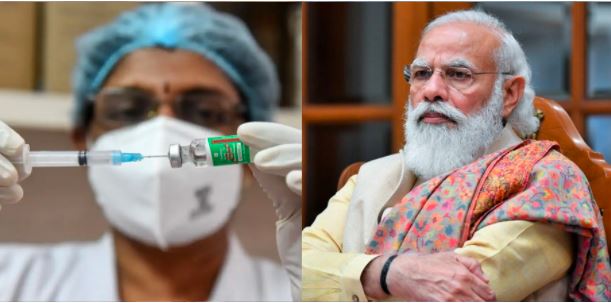India’s vaccination campaign has taken a severe hit in the month of May. It is a hit that can imperil the lives of Indians throughout the course of this year. The need is to ensure that maximum beneficiaries are inoculated against coronavirus before the onset of the third wave, which a study by IIT Kanpur has predicted to arrive in October this year. The growth rate of active cases is declining in India. Indications are that the second wave is finally subsiding. However, the vaccination numbers are far from motivating. In fact, they are disheartening, and India can do much better when it comes to inoculating its citizens.
A variety of reasons are responsible for the nosedive in daily vaccinations across the country. Vaccine shortage in many states, local lockdowns restricting movement and general unpreparedness on the part of vaccine manufacturers to process new vaccine orders quickly are among the primary reasons why the country’s inoculation drive has been severely decelerated. All such reasons aside, the Modi government and individual states too must now step up to the task and declare vaccination for all citizens compulsory.
It might sound unprecedented, but compulsory vaccination of all eligible citizens against Covid-19 is the need of the hour – and the governments have the power to declare inoculation for all mandatory. Knowing that the state governments might not want to take this chance, it becomes contingent on the Modi government to step up and do the right thing. According to an analysis published by the Print, the Centre has many options before it to secure the health of Indians by declaring vaccination mandatory.
Legislatively, the Modi government could enact a specific law incorporating such an obligation. In exercise of its executive powers, the Modi government could make use of the National Disaster Management Act of 2005. The range of powers (section 6 and 10) is such that it would be possible for the government to mandate compulsory vaccination through appropriate departments in the state governments and the central government. The central government can also enforce such a measure through section 62 of the Act.
The government can also employ pressure tactics against people who refuse to get vaccinated. It must be remembered that every non-vaccinated individual is a spreader of the virus to others – making him/her a palpable threat to public health. As such, taking punitive action against such individuals should not be out of scope for the government. Revocation of passports, exclusion from welfare schemes and jobs, etc could be used as options by the government to punish those who refuse to get vaccinated.
India’s daily vaccination numbers for the past few days have been far from motivating. In fact, from a daily peak of 46.4 lakh first doses on April 7, an average of just about 1.8 lakh people are being vaccinated on a daily basis presently. At this pace, it would take years for India to significantly inoculate its population so as to arrest the spread of the ever-mutating Covid-19 virus. The more time we give to the vaccine to spread, the more it mutates in order to survive. Ideally, we should not be waiting for the mutation which, heavens forbid, can dodge vaccines.
So far only 12 states have started vaccinating folks in the 18-45 age group. Of these, Gujarat leads the pack with max jabs in the younger age group. Insights from @IndiaToday Data Intelligence Unit (DIU). https://t.co/KrC2feTNwm pic.twitter.com/woEoNvIVvr
— Rahul Kanwal (@rahulkanwal) May 6, 2021
According to an India Today report, a little more than 13 crores (130 million) people have been partially vaccinated since the country’s inoculation programme began on January 16, 2021. What’s worse, as of May 6, only about 26 per cent of individuals above between the age of 45 – 60 were partially vaccinated. Only 38 per cent above the age of 60 have been given the first dose of the vaccine.
The number of people above the age of 18 is even more dismal. Needless to say, we are not doing enough on the vaccination front – the consequences of which might turn out to be fatal. Making vaccination for Covid-19 compulsory is the need of the hour, and the government must not shy away from the same.





























Try getting an appointment